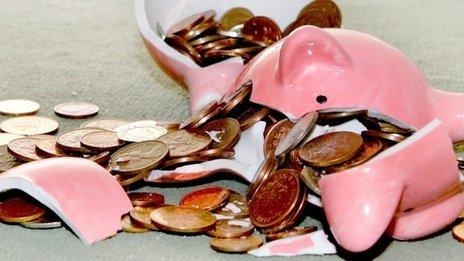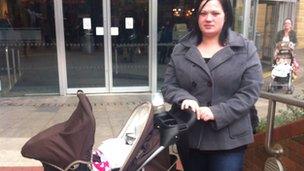Tips on how to deal with your debts
- Published

Almost 370,000 people contacted the CCCS with their money worries last year
If you were asked why people get into debt, you might come up with over-spending, or not budgeting properly.
But the charity, the Consumer Credit Counselling Service, says they aren't the main reason.
It helped almost 370,000 people with money worries last year, and according to the charity 25% of them said their problems were caused by unemployment or redundancy.
Only 10% of the charity's clients say they are in debt because they've not managed their finances properly.
So we asked one of their counsellors, Jonathan Chesterman, to give some free advice to people at a shopping centre in Reading.
The Graduate

Alex Taylor left university last year with a law degree, but he still can't find a job, and now he's feeling the pinch.
He says: "On top of the 18 grand's worth of student debt, I've also accumulated quite a lot of overdraft debt. My bank is pushing me to pay it back, despite the fact that I'm on Jobseeker's Allowance.
"And the Jobseeker's I'm on at the moment is not enough to pay back an overdraft. So I'm just wondering what I can do. Anything I can do to alleviate the problem would be great."
Mr Chesterman's first tip is to move bank account, so any income isn't paid into the same account as his overdraft.
He adds: "Then I'd keep your current bank informed of your situation, and offer them a small token payment, maybe £1 or £2 a month. You can show you're serious about paying your debt back, but you can't actually pay it back at the moment."
The Part-time Worker

Tom Hill, 20, is doing the job he loves. Or more accurately, he's doing four or five jobs he loves. He's a football coach, but can't find one full-time role that pays enough. He is scraping by financially, but knows he could do better.
He admits: "When I go out in town, I spend too much on drinks and things like that. I spend on games and the like, and then look at my bank balance and it's all bad. So too many luxuries, that's probably it."
He says sometimes he will look at his bank balance and realise he's overspent, and so can't do anything sociable until he gets more cash coming in.
Mr Chesterman says the best bet for anyone who finds their money running away with them is to keep a spending diary.
"The first thing to do is get all his expenditure down, what he spends every month, every week - making sure it's all listed - and then review it to see if there are things that can be cut back, any savings that can be made.
"When it comes to luxuries, you will then know how much you've got, and you don't risk spending more than you need to. At least you then know actually that if you want to go out, you've got the money to do it."
Unemployed and in Debt

We meet Mohsin Aslam, 25, on his way back from a job interview. He's looking smart, and hopes this could be the end to his money worries.
He's been out of work for a year now, and has built up £26,000 worth of debt. It's mostly student loans, but he's had trouble with his overdraft too.
He says it really gets to him: "It doesn't feel great. I've got a degree and I'm unable to find work. So obviously I have no means of paying my loan back. It's frustrating really."
Mr Chesterman says the key step for Mr Aslam, or anyone else having difficulties like this, is to keep creditors informed.
"Then they will know what the situation is, the fact that you are trying to find work," he explains. "So any pressure you're under, they know and understand what's going on."
But Mr Aslam says he's tried that, and it didn't work.
"When I told my bank about my overdraft, the bank didn't leave me alone," he says. "They continued sending me letters saying that they needed the money now, and then sent me debt collector letters saying I had to pay this by a certain date."
In that case, Mr Chesterman tells him to get some free debt advice. There are several charities, including the CCCS, that will help out anyone with money worries.
He says that way "you fully understand what your creditors can and can't do, and then you're in a better position to negotiate with them".
The Single Mum

Theresa Curtin, 26, is out for the day with her baby Jessica. Her money worries are really getting her down though. She's on medication for depression, and is trying to get a decent home to bring her daughter up in.
She isn't in a huge amount of debt, but it's having a big impact. She owes about £1,500 on store cards and to a doorstep lender.
"It's scary," says Ms Curtin. "You have debt collectors knocking on your door, not having the money to pay them. With a baby it's hard thinking, 'Who's going to be knocking on the door next?'"
Mr Chesterman says she is in a tough situation, but there is light at the end of the tunnel.
"You can go to a free debt charity and they'll be able to help you apply for a debt relief order. You owe less than £15,000, and so it's a way of getting all your debts written off."
The Dad-to-be

Shea Stedford, 27, has a busy time of it right now. He hasn't managed to find full-time work, so he's set up his own business. It's going well enough so that he's on track paying back about £10,000 worth of debt.
But his partner is pregnant, and Mr Stedford is determined that he doesn't want to accept any benefits.
He says "It's just that I don't want to rely on someone else when I can be doing my own work really. I want to make sure that what I'm putting in is what I'm getting out, not sitting around in some council office waiting for handouts. I don't really believe in that."
Mr Chesterman says he admires Mr Stedford's attitude, but it's not all that realistic in the short-term.
"It's best to apply for benefits, especially with a baby on the way. Get the tax credits and all the help you're entitled to while you build you business up. Once your business is up you won't need handouts."
Mr Stedford says he'll give it a go, as long as he's "doing it the right way".
The Divorcee

Judith Cox, 49, is smiling when we meet her, but she's had a turbulent time recently. She's just got divorced, and says it was an expensive process.
Now she's got to pay a big mortgage alone, and to add to her worries, she built up about £15,000 worth of debt when she was unemployed.
But her biggest problem is that she's not facing up to reality.
"I'm just living day by day, I'm not really budgeting. I'm putting my head in the sand really, but now I've got to stop."
Mr Chesterman says this is very common, but it's "the wrong thing to do".
"You need to be aware of where your debts are, because they're not going to go away. And by knowing where you are, you can pick the right solution for you.
"The top tip is don't ignore the debt problem. Draw up a budget, and if you need it, you can always get free debt advice."